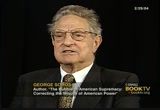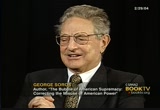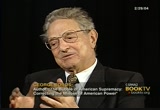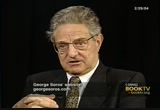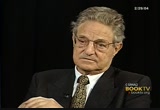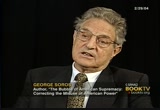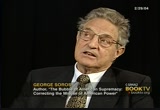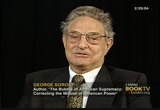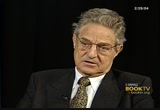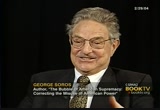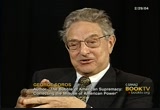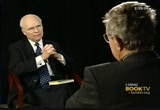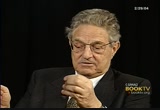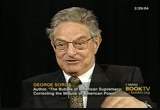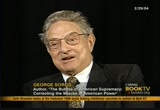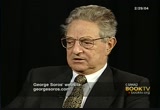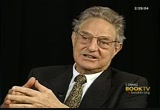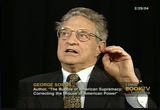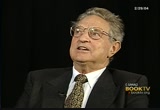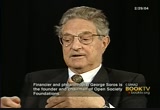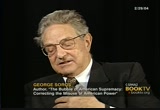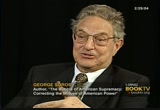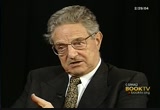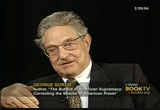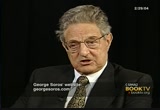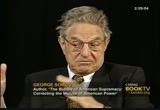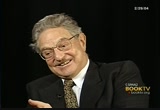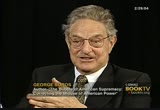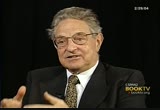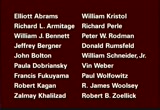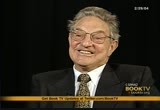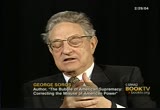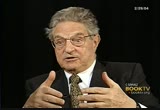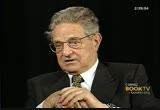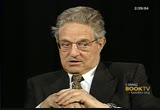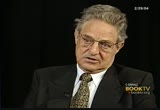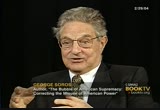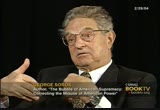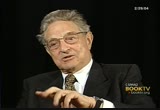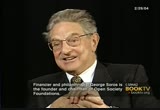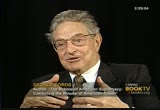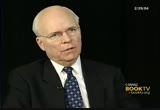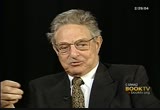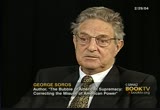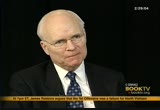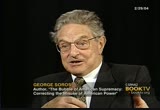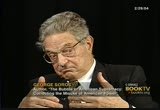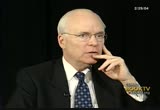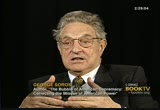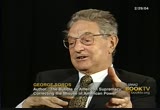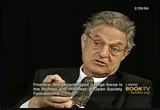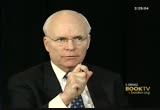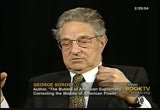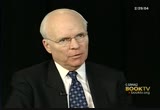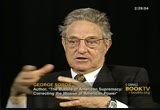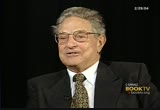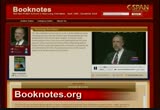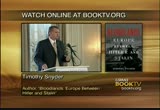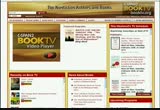tv Book TV Encore Booknotes CSPAN March 5, 2011 6:00pm-7:00pm EST
6:00 pm
>> next time booktv, encore book knows what george soros. mr. soros talked about his book, the bubble of american supremacy, correcting the misuse of american power. he spoke about economic trends and advocacy for open societies and decency in world politics. it's about an hour. .. bubble of american supremacy." what does that title mean? >> i draw a comparison between the stock market bubbles and the -- let's say america getting off the rails under the bush administration after the terrorist attack on september 11. >> do you remember where you were on september 11, 2001?
6:01 pm
>> yes, i was in beijing, coming from monogolia. my son told me, turn on your television. i actually saw the second plane crash into the tour. even though you're in beijing, it's like being there, so that's the -- it has the same impact. >> what was the reaction of the people in beijing? >> they were polite, but sympathetic. >> what were you doing in beijing? >> delivering a speech on china's future and it was reconciliation with the chinese administration. neca the chinese administration because i had a foundation there which i closed in 1989, and this was sort of a gesture on their t part that -- sort of rehabilitating what the foundation had been doing. c-span: is the foundation open again? guest: no. no. c-span: why did you...do guest: i closed it in '89.
6:02 pm
c-span: why? is guest: well, because it basically fell into the hands of the political police in china.>> we set it up in '89 to promote ideas of open society, and it got caught up in an internal power struggle. and it's a very intricate and -- and fascinating but long story. and then i found out that the i political police was actually in charge.c i closed it. but now the idea of open society is acceptable. i mean, it is actually something that motivates people in china, and it's -- it's an idea whose time has come.n c-span: how many open society foundations do you have now in how many countries? n guest: well, it's difficult to l
6:03 pm
because we have national foundations that somewhere over maybe 30. but we also have regional, for instance, southern africa, western africa. it covers a number of countries. we have now actually fairly global coverage, but we don't have the national foundation that's we had when the communist regime was collapsing and we wanted to help build open societies. we have about 13. >> your book cites the fact that you spent lots of money on 500 -- 35,000 russian scientists. explain that and how much did you give them? >> well, see, when the soviet system collapsed, i wanted to help preserve the values that
6:04 pm
are really important and soviet science, natural science is world class. and there is danger of the scientists going to work for saddam. so to preserve science and to demonstrate what can be done in helping a country in distress, i set up this science foundation with $100 million. and we gave -- it was $500, which at that time you could live on for a year to some 35,000 top scientists in a very transparent basis. how many times they've been cited in the scientific journals. everybody was cited three times.
6:05 pm
it was $500. it was quite a revolutionary way of going about it. it made a tremendous impact because it actually helped those people to survive during a very difficult year. >> what year was it? >> i think that it was 199 -- 1991. >> "forbe's" magazine said that you have $40 billion. that you're the 28th richest man in the world. would you like to confirm it or change it? >> that's their estimate. >> we can assume that you made a lot of money? >> i made a lot of money. and i also have given away a lot of money. >> how much do you think that you have given away? >> we have calculations. i don't have the actual figure. at the height we spent over $600 million a year.
6:06 pm
and currently we're returning around $450 million a year. >> that's all your money? >> it is. >> how did you make it? >> in the financial markets. >> where? >> globally. >> your headquarters -- where do you live? >> new york. >> how long have you lived in new york? >> i came to the states in 1956. i left hungary in 1947 and went to england and after nine years moved to america, and ever since then i have lived here. >> born in what year? >> 1930. >> why did you leave there? >> well, i'm jewish, and when i was 14 years old, the germans occupied the country and that was really the formative year of my life. so -- that made me. it's because my father had the
6:07 pm
foresight to get us papers that we -- false paper that's we survived. it was really my father's finest hour. and it was a vicious regime. he not only saved his life and his family's life, but he also helped a lot of people. that was an important experience for me. after that came the communist regime and it was very repressive and very boring, frankly. i wanted excitment. wanted out. when i was 17, i went to england. >> what did your father do for a living? >> a lawyer. >> how long did he live? >> he died in this country in 1968. >> you left hungary in 1947. >> yes.
6:08 pm
>> when did he leave? >> 1956, there was a revolution and he and my mother walked across the border and came out. we were reunited after nine years. >> do you remember world war ii? >> very well. >> what do you remember about it? >> i remember a lot. even though i was quite young, we were listening to the bbc, which was a source of information. my father was sort of very interested in what was going on. and the situation was gradually deteriorating and there was discrimination against jews. we had to go to special classes and so on. so it impacted our life very much and then in 1944 the country was actually occupied by the germans and jews were collected and deported. >> did anybody tell you in hungary why they didn't like
6:09 pm
jews at the time? >> yes. that is something, again, very, very much a part of my psyche, anti-semitism. and, you know, hatred of jews. it was quite wide spread within hungary. >> so you left there in 1947 at age 17 and went where? >> england. >> where did you go there? >> to study at the london school of economics. and, of course, i was interested in how society works and how we can understand what -- how we behave and i came under the influence of kyle popper, his philosophy of open society. came home to me because he made the point that there is a
6:10 pm
similarity between the nazi regime and communist regime. because they both believe that they have the ultimate truth. and since nobody is in possession of the ultimate truth, if you have a dog ma like that, you have to -- dogma like that you have to enforce it. that's what they have in common. and he had the alternative, an open society which is the recognition that nobody is in possession of the truth, therefore you need a critical process and you have to respect other people's opinions and interests and find a way for people with different views to live together, which is, of course, democracy. and that's the society we live in and -- and thankfully, you know, later on when i made more money, i set up a foundation and
6:11 pm
i made an open society the objective of my foundation much >> did you talk to him about that -- >> foundation. >> did you talk to him about that? >> yes i did. >> what was -- >> yes, i did. >> what was his reaction? >> he was very supportive. in later life we had good contact. a funny thing, he himself personally was very intolerant [inaudible] and, in fact, one point i said to him how come you're intolerant? >> -- there is really only one person who understands the weaknesses of my theories, and that's me. >> when i read about your
6:12 pm
background and carl popper's background, if you track the future, something split at some point. he ends up at the hoover institution along with frederick vonhyak, who is not known as a liberal. and they end up there and he ends up in the united states and dies in 1944. what happened along the way? would you agree on politics if he were still alive? >> carl popper, yes. hyak was a bit of a protector and responser of popper. he was more successful. but there was an ongoing debate between them. a written debate, which is a very interesting one. and hyak was an apostle of market and popper was much more
6:13 pm
for social engineering. so they -- they were somewhat separate in their thinking and i suppose i'm closer to popper, but i wouldn't be that far from hyak, i think, on some issues like issues of freedom. but i believe that markets are not perfect. we -- it would be wonderful if you could rely on market ee quill libyum. un-- equal libyum. unfortunately the world is not made that way. and i think that with our -- i developed my own theory and i think that it has been borne out by -- by the facts, the
6:14 pm
evidence. >> when did you first think that you wanted to make money? >> oh, i think i was involved in money making even at the age of 14 when we were in hiding, my father used me to act as the runner, so to speak, exchanging on the black market. because being 14, i wouldn't be suspected. i was involved in currency markets from the age of 14. >> in buddha pest? >> in buddha best. >> where were you hiding? >> in buddhapest. >> where? >> in different parts of the city. >> had your father done well financially? >> not terribly well. his formative experience was the russian revolution. he lived through it in siberia.
6:15 pm
he was so glad to survive, that he didn't want to spend his life making money. he wanted to live well. and so he actually spent the money that was in the family -- there was -- it is very unusual to have someone, middle class that would actually dispose of property and live it up. and he did that. so he disinvested and i -- you know, i'm different from him. because i live it up money, i lived through difficult circumstances in england and so on, so i realized how important it is to have money. so i was interested in making money. >> as someone who made a lot of money, do you live well or did it impact on you -- >> no i live very well. and i have a lot of help from my wife in spending money. she is very good at it. i rely on her for that.
6:16 pm
but i don't really, really care for money very much otherwise i wouldn't be giving it away. >> 1956 you say that you came here to the united states. >> yes. >> that means that you lived in great britain for nine years. >> yes, sir. >> what did you do after school? >> i took time getting a job and i started working in a fancy goods distributor and manfacturer and then i became a traveling salesman, and i got sort of further and further away from doing something appropriate for my education, so i changed direction and got a job in the city and slowly made my way up and i was offered a job in america and i came over here. >> so your job when you left london was what?
6:17 pm
>> i was then already in the financial market trading between different markets called arbitrage. i was buying gold shares in south africa and selling them in belgium. >> when you came to the united states, where did you go? >> to a small firm doing that. i developed arbitrage and from there i got involved in security analysis and eventually i set up my own fund. >> could you define arbitrage? >> arbitrage is buying in one market and selling in another. so either it's geographical that you buy in south africa and sell in belgium, or it can be between different stocks. let's say that there is a merger, and then you buy the company that's being merged and sell the stock that is -- that you receive in exchange. so it's -- it's reducing the
6:18 pm
differences between different markets. >> two questions. when did -- when did you all of a sudden look up and say i've got a lot of money? and, secondly, when did you give the first money away? >> i would say that it was around 1979 when my fund reached $100 million. and my personal wealth reached maybe $20 million and it was a tremendous drain doing this and i asked myself why am i doing it ? and that's when i set up the -- really reflected on it. it was a bit of a mid life crisis. and that's when i set up the open society foundation, 1979. >> in 1979, i'm trying to do
6:19 pm
some quick math. you would have been -- >> 49. >> were you married? >> yes. >> did you have children? >> yes. >> how many? >> three. and as part of the mid-life crisis, i was divorced from my first wife. this is all part of the period of turmoil, what's the meaning of my life, why am i doing what i'm doing? >> when did you first become political? >> i would say that -- that the open society foundation itself is a political idea. it's not a party political idea. but it is a political idea. so i became political at the age of 14 when my life was threatened by the nazi regime. >> but how about partisan politics. i'll go to your book. we talked about you, not a lot about the book. you said that i considered the
6:20 pm
bush doctrine a preemive military action per nishus and so do many others around the world. it's clear from reading the book that you don't care much for george bush, is that right? >> that's right. i have become more party political because i'm opposed to the bush administration's policies. so i have been fighting for the ideas of open society through -- all over the world, including in this country, we have been active as a foundation for some years. but now i came to the conclusion that the most important thing that i can do is to stand up and oppose the bush doctrine and this i did at a time when it was unpatriotic to be critical.
6:21 pm
because after the terrorist attack and the u.s.a. patriot act when ashcroft said that those who oppose this act are giving aid and comfort to the terrorists. it had a resonance of what i was supporting other people doing in other countries and so i felt that having spent all of that money and being so engaged over there, that the same principles i have to be engaged in over here. >> do you belong to a political party? >> i suppose that i would be a democrat, yes. >> when was the first time that you gave a political contribution? >> i have given political contributions in the past several campaigns, but not of the magnitude that i have done recently. >> and what everybody is reading
6:22 pm
about now is that you have given $10 million to do what? >> grassroots organizing in 17 states. and another $2.5 million to move on, which is a kind of internet mobilizing force. >> what's it like to have a lot of money? >> well, first of all, it's very pleasant because you don't have concerns, you know. it also gives you a degree of freedom and it also gives you a degree of power. and i value the freedom that it gives me. the ability to stand up for what i stand for. the power, i can't say that i don't enjoy it.
6:23 pm
it becomes part of your personality. but i -- i consider it a responsibility. because i do have a platform, you're interviewing me. and so i have to use that platform in a responsible way and this is in a way what i'm arguing about in the book "america," america has power. we are the dominant power in the world. that imposes on us a special responsibility. you have to be concerned with the welfare of the world. congress basically decides, but only americans have the vote in congress. >> you -- you write about -- in the book that you've become
6:24 pm
rabid in your political views. what did you mean by that? >> i'm pretty forceful in expressing my opposition to the bush administration. and there is a certain danger which i actually turned into almost a reality that because i considered the policies extremists, that i, myself, have become an extremist. and that actually -- if that happens, then i have failed. because i think that i am -- believe in an open society. i recognize that i may be wrong. and, in fact, i'm admitting that i may actually be actively wrong by being so rabid. but i feel that i have to state my view in a very
6:25 pm
straightforward. and i feel passionately about it. >> what would you say that if george bush turns out to be successful and because of his intervention in iraq, the dominoes fall, korea, libya, iran, and other countries? a show of force in the end is what was necessary. >> i don't that's what's happening. qaddafi came in from the cold and not much to do with iraq. he has been trying to do that for some time, negotiations, lockerbie started before bush was elected. to claim qaddafi as a victory, i think, is wrong. in the case of north korea, we have gone full circle. president clinton had an agreement to contain the -- the
6:26 pm
proliferation plan, which was basically renounced by president bush when he came in and i knew -- and i personally know the leader of south korea and he had the sunshine policy toward north korea. his idea was that if the sunshines, people take off their overcoat and open up. it may or may not be true. anyway, that was his policy. he came to this country, he was one of the first visitors trying to quens bush to follow him. colin powell supported him. bush -- it was the first time that bush repudiated colin powell and told the leader of south korea, no, we're going to take a hard-line and we have come full circle. we are depending on the chinese
6:27 pm
to act as intermediators with north korea. and i think that we can make progress because that is a very, very poor country. very repressive. all regime. but they need outside assistance. and so we are coming back and we are negotiating. so, yes, maybe we'll make progress, but it isn't because of our unilateral throwing about our weight that we're succeeding, but because we are using negotiations and we're using allies. >> you said that the administration's ideology is a crude form of social darwinism. what does that mean? >> the idea of natural selection, survival of the fittest and -- and the fact that
6:28 pm
it is a -- that is, in fact, what's happening. that's how species survive. but the fittest is not -- does not mean who is the strongest in -- in combat. the fittest is who can cooperate better? who can find allies? it is a distortion of idea of darwin's idea of evolution to say that if military power that will determine who is going to rule the roost. and it is a falls idea. -- false idea. >> you write about the new american acceptry in your book and a letter that was written to president clinton in 1998 -- century in your book and a letter that was written to president clinton in 1998. what is it? >> it is an ideology that international relations are
6:29 pm
relations of power, not law. that international law follows power and since we are so powerful, we ought to use our power and the previous administrations have been remiss in -- in not -- in doing that. and we must correct that. we must build up our military forces and we must project that power. and i think this idea is a dangerous idea. it's false. and it is counterproductive. and then because of the terrorist attack -- terrorists' attack, this group gained the upper hand and has dominated our policy. >> we first started hearing about this on our call-in shows, when people got on
6:30 pm
thenewamericancentury.org had signed it. we will -- you can see it on the screen over there. people that are on this list signed this letter in 1992 to president clinton that they wanted to -- 1991 to president clinton that they wanted to get rid of saddam hussein. john bolton, robert indicating ann, his wife is the foreign policy adviser to vice president cheney. mr. calazad is the ambassador to afghanistan -- hamid karzai is the am ambassador to afghanistan. >> it is an interesting thing because he compares europe. it says that europeans are from venus and americans are from
6:31 pm
mars. that we have the power, therefore we believe in power. europians don't have the power, therefore they don't believe in it. this is a neomarxist idea. namely that the material conditions determine the ideological super structure. it is interesting that the neoconserve -- neoconservatives, it is actually marcism. >> if you go down the list on the right-hand side besides don rumsfeld and richard perle at the top and bill kristol, you have paul wolfowitz, and he is the number two man at the pentagon. but you say in your book that paul wolfowitz was taught by leo straws at university of chicago. you -- leo strauss, and you talk about carl popper and paul
6:32 pm
wolfowitz. what would have been the difference of what they were taught? >> i wasn't aware of leo strauss. they should -- they didn't refer to each other. so i discovered leo strauss through wolfowitz and leo strauss talks about natural rights. natural rights. you see, there is the -- the declaration of independence. these -- these ideas they hold to be self-evident. right. and then come the ideas that are wonderful expression for the principles of an open society. but the introduction, self-evident leads to a belief in some truths, which are self-evident, cannot be denied by anyone. so leo strauss took off from
6:33 pm
that sentence and built on natural rights and carl popper took off from the rest. >> do you think that that group that's on that list there is not interested in an open society? >> no, i wouldn't go that far. paul wolfowitz, who i used to wrk with quite closely -- work with quite closely at the time of the bosnian conflict and we both urged the clinton administration to take a more assertive position. so we were on the same side. and i believe he doesn't believe in democracy. i would like to have a debate with him on this issue because we have now parted company. because i think that he -- he is guided by this self-evident
6:34 pm
truth and namely that, you know, we know what democracy is. and when you accept american values, then you are on the right track. and i say that democracy means that people have a right to decide for themselves. and they don't necessarily believe in american values. and they can still be democratic and they can still be an open society. >> is there another country in the world that you could live in comfortably that has a good democracy? >> yes, there are many. europe is -- would be quite comfortable for me. and i think that europe has some democracies. i think that brazil has done wonderfully since the -- since they overturned the military dictatorship. and i think that is, for instance, the way that the presidential elections were
6:35 pm
fought recently where there was much more free time on television and you had, you know, 20 minutes or 30 minutes to present your case and not 30 seconds advertisements. it was actually a great exercise in democracy. >> what year did you become an american citizen? >> 1962. >> and are you worried enough that you would consider moving somewhere else? >> i'm not there. i'm not -- i haven't considered that. i -- i think that, first of all, i think that the battle has to be fought here and moving away would be sort of abandoning it. and i also think that we are an open society and we are a democracy and i think that, of course, one has to rely on the
6:36 pm
electorate and their incite to -- to have something similarly allergic to the deception that this administration has -- has exercised. >> how many people would you say is on your personal payroll at this point? with all of the efforts that you have around the world. >> i think that it does run into the thousands, several -- a few thousand. maybe 2,000. >> and when you -- >> maybe -- that may be too many. but it's over 1,000. >> and how many decisions do you end up make in regard to all of these 30 foundations and such around the world, how many of them come to you? >> i think that i'm very good at delegating. first of all, each foundation has its own board and they decide how they use the money and i only decide whether to give them money or not.
6:37 pm
>> are you on each of the boards? >> no, i'm on none of the boards on the national foundations. but i do pay attention to them and i visit them and i talk to the members of the board. and i have an overall view and i'm engaged in some of the programs and some really exciting ones. but i must say that the best things are the things that are done without my knowledge. when i go to a country and i see what they're accomplishing and it is -- that is a real pleasure. because i don't know about it. and usually when i know about it it is because there are some problems. >> you get a lot of criticism? >> a fair amount. although i think that i'm now sort of filling the quota that i department get before.
6:38 pm
>> and, you know, you go on the website and conspiracy they'rorists, you're a member of the council on foreign relations and all of that is there enough crute any on what somebody like you -- enough scrutiny on what somebody like you can do? >> i think that basically whatever influence i have is transparents. we publish our annual reports when i give away money, which is not through the foundation like i did in this case. >> you mean here in this country, the $10 million to get out the vote? >> so all of that is transparent. and in fact, there is a lot of criticism and now i get a lot of , you know, abusive mails and there has been really a campaign
6:39 pm
to discredit me. i think that the republican -- the bush propaganda machine has tried to -- to define me before i could define myself through the book. >> what criticisms sting the most? >> well, for instance, that i have accused bush of being a nazi, which i didn't do and wouldn't do. >> it comes from moveon.org? >> no, before that. it comes from the various letters, fund-raising letters that the republican national committee sent out saying that this man is calling bush a nazi. we have to spend billions and we must rally for the cause. i guess i raised more money for the republicans than for the organization that's i support. so i think that it has been a
6:40 pm
fairly conservative campaign. and it has worked. >> of all of the foundations that you have, where's the biggest? >> it used to be russia. but i just now brought it to a close. i spent a very large amount of money, close to $1 billion in russia. >> was it worth it? >> i think that it was worth it. unfortunately russia has gone the wrong way, so i don't have much to show for it. but i think that we did the right thing and it's regrettable that now it has gone wrong. >> why did you shut your foundation down? >> because we were doing a lot of things that, in fact, the state or a local people ought to be doing. we were helping education, science, and so on. and this was appropriate when the country collapsed and the
6:41 pm
system collapsed and it was worth saving these institutions. now it's more -- the revolutionary period is over and so it is not appropriate for me to spend that money. but i will continue supporting a civil society organization, particularly those that act as monitoring and critical of what the -- of what the reconstituted state is doing, which, as you probably know, is becoming quite repressive in its behavior. >> so what would be your largest foundation now? >> we don't have any one that is large because we are very much engaged in central asia where we spend, let's say, $5 million per
6:42 pm
country. so i would say that individual foundations spent very few would have more than $5 million a year now. and then when we have like southern africa that would have $10 million. so it is in that range. so there is no -- no one that sticks out. >> so what is somebody in a position like you do -- how do you learn to trust people? i assume that you have lots of people wanting your money. what kind of mechanism do you set up -- people probably say a lot of nice things to you. they want to give you awards, they want to tell you that you're the greatest man who ever lived. how do you sift through who is honest and who's not? >> you become very bureau accurateic. -- bureaucratic. when we set up the foundation it
6:43 pm
went from $3 million to $300 million a year in a matter of a few years. i basically gave away money without any controls. i didn't even have a budget. now we have a budget and we have procedures and we are now extremely bureaucratic. >> and so does that protect you? >> it does. because there's a process and, in fact, people used to say, well, george soros promised that we would have money, he doesn't count on documentation. so there are constraints on me. >> what's the worst thing about having a lot of money? >> yeah, well, in giving money away, people tell you what you want to hear, and then they do what they want to do. but i think that is natural. i accept that and i -- deal with
6:44 pm
that in that way and i must say that i think we're doing quite a good job. >> now your kids, what do they do for a living? >> well, my older children, two of them are in my -- my firm. and the third one has a foundation. she is committed to tibet. we have made deal, you know, at the time between the -- the spaniards and the portuguese, we divided the world. my daughter gotti bet and i got the rest. -- got tibet and i got the rest. >> do you have younger kids? >> yes. >> and how old are they? >> 14 and 16. they have suffered from being rich kids and having a famous father.
6:45 pm
it has made things -- it created problems. but i think that we are coming through them. >> what kind of problems? >> well, problems of embattlement and not enough material constraints. everything done for you so you don't have -- don't develop a sense of accomplishment from doing things for yourself. >> should people be allowed to make the kind of money you've made? >> not necessarily. but it's -- it might be excessive. but what are you going to do about it? you know, you -- >> tax? >> well, i have very much advocated retaining the estate tax. i think that it is an excellent place -- an excellent moment to tax wealth because the wealth
6:46 pm
creator is gone. it is inherited by others who are not necessarily qualified to make the most of it and so i am very much in favor of that. and i think that it is unconscionable that this administration has tried to abolish it. and it is amazing how they've gone about it by calling it the death tax and people believe that it applies to them. where really it only applies to anybody over $7 million or even more $15 million of capital. >> you've been around the world. a lot of places. do americans have too much? >> i think we are learned to make the most of it. so i don't think that you can ever have too much. but when you have a lot, you then have to be concerned about
6:47 pm
other things like, for instance, preserving the environment in which you live. the so-called externalalities like free goods, like air. we have tremendous power over name. and we can destroy nature. and we have tremendous dee struckive power militarily and we -- destructive power militarily and we can and probably will destroy our civilization if we don't pay attention. >> have you picked a candidate that you want to support? >> no. i'm keen on dean. but i would be very happy with -- happy with general clark or john kerry. i think that there are a number of candidates. i don't necessarily agree with all of their views and they
6:48 pm
don't necessarily agree with mine. but i think that it would be much, much preferable. because it would be a change of direction. >> for months we went through the debate in the house and the senate, actually years, on campaign finance reform. and it was passed and it was upheld by the supreme court and now critics are saying that people like you can get around it all by spending your $10 million in a separate foundation. what do you say to that? >> this is true. and i think that the rules need improvement. but i play by the rules that prevail. so if these are the rules that prevail, this section 527, i didn't invent it. didn't set them up. they were there and i'm contributing to them. and actually the republicans
6:49 pm
have more money both inside the party and these 527's, so i don't think that my concern about campaign finance should stop me from playing by the rules that prevail. but at the same time the fact that i use those -- fact that i use those institutions should not necessarily mean that i wouldn't like to see them changed. >> in the past, you know, you look back from the time that you left hungary and went to england and then the united states, where were you politically along the way, the way that the united states would relate to during a cold war country like china, one of these countries? were you on the side of most of the administrations here an their foreign policies? >> i was very clearly on the
6:50 pm
side of the west. and therefore the united states was the leader of the free world. it doesn't mean that i was supporting all of the policies. in fact living in the free world you have to be critical. so i was actually quite critical of clinton's policies. i was very critical of the missed opportunity in -- when the soviet system collapsed. i was advocating for a more interventionist approach. i thought this -- i talked about a new marshal plan and i was laughed at when i talked about it. and so i was critical. i was critical of our policies in bosnia, kosovo. i advocated intervention in
6:51 pm
those countries. but i was and i remain firmly committed to freedom and open societies. >> what did you think of richard nixon? >> i thought he pushed -- he pushed the envelope a bit. -- the envelope a bit with watergate and it was a test for our democracy which we passed with flying colors. [inaudible] we didn't do so well with the iran couldn't a ra controversy because -- iran-contra controversy. we didn't have the live, really, to push it too far. >> what did you think of jimmy carter? >> i think that he is a great ex-president.
6:52 pm
i have a very high regard for him as a person. i don't think that he was effective as a president. >> what about ronald reagan? >> i was critical of reagan because that was already the beginning of what i considered the marcist fundamental approach. >> and george herbert walker bush and his first attempt in iraq. what did you think of that? >> it was appropriate to intervene but i also was not a fan of the first bush, so i'm generally speaking critical of whatever regime prevails because they're all imperfect. they can all be improved and so i tend to be critical. >> near the end of your book, you say that george bush, the son, will sink in popularity and will be defeated.
6:53 pm
why do you say that? >> i wouldn't say that with quite the same conviction today as i did at the time of -- when i actually sent the book to the publisher. because at that time because of the iraqi intervention this suspension of critical -- of criticism ended. he could no longer dismiss this as being unpatriotic. because he overstepped the mark by using the terrorism as a pre-text for going after saddam. i felt at the time that the criticism was really making headway.
6:54 pm
now i see that actually the -- propaganda machine is doing a good job. so i am -- i say that at the end of the book, it is not a foregone conclusion and i'll do haver i can to make my prediction -- i'll do whatever i can to make my prediction come true. >> this is your eighth book. how does a man like you have time to write a book? >> i make time. i haven't written it all myself. it's a short book. it doesn't take long to read and it didn't take that long to write. and also i crib from my other books. i keep on saying the same things and i said it before. so it is not that difficult. >> where do you write them? >> i write long hand and or i dictate. sometimes i just speak like i'm
6:55 pm
making a speech or i write long hand. i usually do it between 3:00 -- starting at 3:00 in the morning. >> so you rise early? >> i wake up and if i have something to say, i say it. so i very often write in the morning. >> how many days of the year are you on the road around the world? >> not that many. because i try to cut it short. and i actually spent quite a bit of time at home writing and reading. >> when you travel, do you travel on your own plane? >> no. >> you go commercial? >> i go commercial when i can and i charter a plane if it's more direct. so if i can go on a commercial route, then i take a commercial flight. and if there's no connection, then i take a -- charter a plane. >> is your company still active and are you still making money?
6:56 pm
>> the company's active and i have a new generation of people and i'm distanced from the money making. >> still engaged? >> still engaged. and actually it is quite healthy for me because it sort of gives me -- keeps me in touch with reality. because when you get caught up in your ideas, you may lose touch with reality. and so it's a funny thing that you should consider the financial markets as reality. but it is. >> by the way were you able to escape those bad years there when people lost a lot of money? >> no, there was one time when somebody was managing my fund dropped 20% and i think that we recovered a little bit of it. but i did have a bad year. so -- >> are you writing another book? >> no. >> this is it for a while?
6:57 pm
>> this is it. >> our guest has been george soros. it is called "the bubble of the redesign booknotes web site now features over 800 knowable nonfiction authors interviewed about their books. there you can view all the program to the transcripts and transcript and use the searchable database to find links to the authors blogs facebook pages and twitter feeds. booknotes.org the brand-new look and feel. a great way to watch and enjoy the authors and their books. >> i would like to talk to you about this afternoon as very briefly is a catastrophe, a catastrophe in which 14 million people, chiefly children and women and the aged, were killed over the space of just 12 years by two regimes, the nazi german regime and the stalinist regime
6:58 pm
in the soviet union. this total figure of 14 million is in itself i think astonishing. it is a number which is too large to grasp and i will return to what that means and how we might try to grasp it, but it is also a number which tells us something very special about these two regimes. we now know, or at least have a pretty good certainty about the total number of people killed by these two regimes. it was about 17 million. of those 17 million, about 14 million were killed in a place that i'm calling the "bloodlands". that is to say, not so much russia, not so much germany but the lands between berlin and moscow, the western rim of russia, the baltic states, belarus, ukraine and most of
6:59 pm
poland. so what this means is that all the killing that took place, organized by both hitler and stalin from atlantic to the pacific, the tremendous majority of this mass murder was concentrated in this relatively small territory. >> the is visit booktv.org to watch any of the programs you see here on line. typed the author or book title and the search bar in the effort left side of the page and click search. you can also share anything you see on booktv.org easily by click share and selecting the format. booktv streams live on line for 48 hours every weekend with top nonfiction books and authors. booktv.org. >> and this time we went, "washington times" senior editorial writer james robbins argues that the tet offensive was actually failure for the north vietnamese and that the u.s. media and lt-
282 Views
IN COLLECTIONS
CSPAN2 Television Archive
Television Archive  Television Archive News Search Service
Television Archive News Search Service 
Uploaded by TV Archive on

 Live Music Archive
Live Music Archive Librivox Free Audio
Librivox Free Audio Metropolitan Museum
Metropolitan Museum Cleveland Museum of Art
Cleveland Museum of Art Internet Arcade
Internet Arcade Console Living Room
Console Living Room Books to Borrow
Books to Borrow Open Library
Open Library TV News
TV News Understanding 9/11
Understanding 9/11
